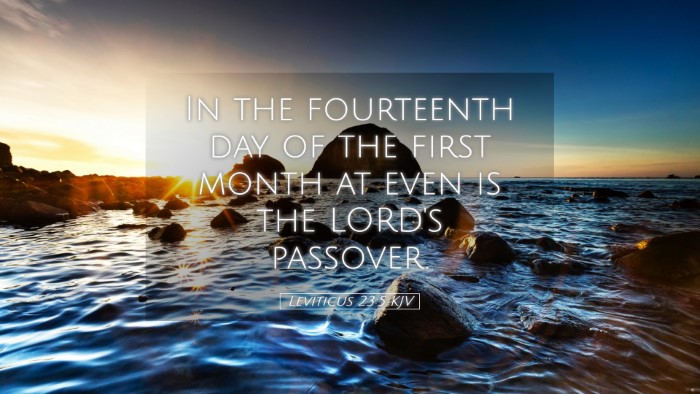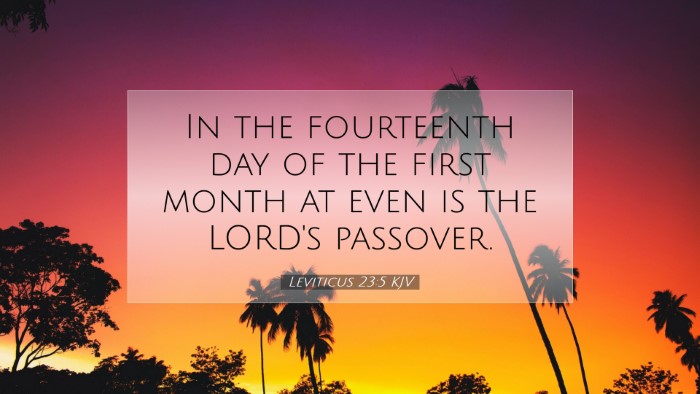Commentary on Leviticus 23:5
Leviticus 23:5 states: "In the fourteenth day of the first month at even is the Lord's passover." This verse introduces the observance of the Passover, a foundational event in Israelite history, laden with spiritual and theological significance. It serves as a crucial moment not only for the Israelites but also for the unfolding narrative of redemptive history.
Historical Context
The instruction contained within Leviticus is part of the larger priestly code established for Israel after their exodus from Egypt. The Passover commemorates the deliverance from slavery and the sparing of the Israelite firstborns during the final plague upon Egypt, which serves as a manifestation of God's judgment and mercy.
Theological Implications
Passover is not merely a historical event; it carries deep theological implications:
- Redemption: The Passover epitomizes the theme of redemption, demonstrating God’s faithfulness to His covenant people. It signifies liberation from bondage and the promise of freedom.
- Substitution: The lamb’s blood on the doorposts points to the necessity of a substitute for salvation, foreshadowing the ultimate sacrifice of Christ.
- Community and Worship: Observing the Passover brings the community together, emphasizing collective memory and worship as a vital part of Israel's identity.
Insights from Commentaries
Matthew Henry
Matthew Henry notes the significance of the timing in this observance. The fourteenth day speaks to the precision of God's instructions and how important it was for Israel to follow God's timing in worship. He emphasizes that the Passover lays the groundwork for understanding God's redemptive power throughout Scripture, leading ultimately to Christ, the true Passover Lamb who takes away the sins of the world.
Albert Barnes
Albert Barnes focuses on the inherent symbolism of the lamb in the Passover. He suggests that the lamb, representing innocence and sacrifice, serves as a veritable preview of Christ's atoning death. Barnes also highlights the seriousness with which the Israelites were to approach the Passover feast, as the act was not only a commemoration but also a solemn reminder of their identity as God’s chosen people.
Adam Clarke
Adam Clarke provides additional insights into the rituals and the significance of the Passover meal. He expounds on the elements involved in the observance, such as the unleavened bread and bitter herbs, which symbolize the haste of their departure from Egypt and the bitterness of slavery, respectively. Clarke also contextualizes the Passover within the broader narrative of the deliverance of Israel, viewing it as a pivotal moment in God's redemptive plan for humanity.
Application for Today
The lessons gleaned from Leviticus 23:5 extend beyond the historical context to contemporary application:
- Reminder of Redemption: Each Passover remembrance urges believers to reflect on their own deliverance through Christ, encouraging a posture of gratitude and worship.
- Unity in Worship: The communal aspect of Passover reminds the Church of the importance of gathering together to remember Christ's sacrifice.
- Obedience to God's Commands: Just as Israel was called to observe the Passover with fidelity, modern believers are called to live lives of obedience in alignment with God's revealed will.
Conclusion
In conclusion, Leviticus 23:5 is not merely a ritualistic command but a profound declaration of God's covenant faithfulness and a typological sign that points to the ultimate sacrifice of Jesus Christ. The Passover serves as an abiding reminder of God's redemptive purposes and our response to His grace. Thus, as pastors, students, theologians, and scholars study this verse, they should recognize its depth and resonance within the broader narrative of Scripture, encouraging both individual and communal expressions of faith.


